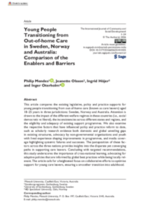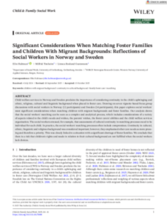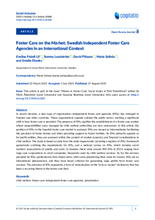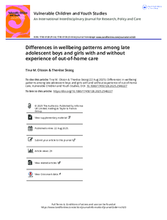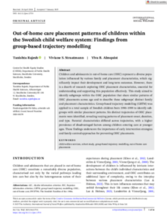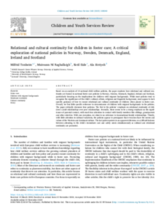Displaying 1 - 10 of 139
This article reports on Swedish adults who were adopted from Colombia decades ago and are now searching for their birth mothers after discovering that many international adoptions — involving around 60,000 children including nearly 5,700 from Colombia — were marred by irregularities such as false documentation, coerced consent, and children declared orphans when they were not, leaving adoptees without accurate identity information and grappling with psychological impacts of lost heritage.
The blog describes a visit to a Swedish Family Centre, where health, education, and social support services for families with young children are co-located under one roof to provide early, preventative, and relationship-based support.
This article compares the existing legislative, policy and practice supports for young people transitioning from out-of-home care (known as care leavers) aged 18–25 years in three jurisdictions: Sweden, Norway and Australia. Attention is drawn to the impact of the different welfare regimes in these countries (i.e., social democratic vs liberal), the inconsistencies across different states and regions, and the eligibility and adequacy of existing support programmes.
This study, based on vignette-based focus group discussions with social workers in Norway and Sweden, examines how they balance children’s cultural, ethnic, religious, and linguistic continuity with other needs when matching migrant-background children with foster families, revealing a complex process shaped by the child’s and parents’ wishes, foster carers’ capacities, and organizational constraints. While social workers value cultural continuity, they often prioritize more urgent care needs—especially amid a significant shortage of foster families—creating a risk that children’s rights and needs related to their cultural background may not be fully met.
This article examines the rise of independent foster care agencies (IFAs) in Sweden, which have introduced a market-based model into a system once managed solely by child welfare authorities. Drawing on national data and social worker perspectives, it explores the benefits, costs, and controversies of IFAs, including concerns about profit-making in foster care.
This study explored wellbeing among Swedish adolescents with and without out-of-home care experience, using cluster analysis of 10 wellbeing indicators. It found two distinct groups—one with higher wellbeing and one with lower wellbeing—with girls, unemployed youth, and those with care experience more likely to fall into the reduced wellbeing cluster.
This article examines how foster parents in Sweden navigate and reproduce public suspicions about financial compensation, drawing on texts and interviews from a three-year research project. While payments are essential for recruitment amid a shortage of foster families, foster parents face sensitivity, suspicion, and blame, leading them to develop strategies to deflect questions and avoid stigma.
Using group-based trajectory modelling on Swedish children born 1990–1999, this study identified six distinct patterns of out-of-home care placements that varied in onset, duration, and type. Findings show greater parental disadvantage among children entering care earlier, highlighting the need for early intervention and family-centred prevention strategies.
An analysis of 14 national foster care policies across six European countries found that while most acknowledge children’s cultural, ethnic, religious, and linguistic backgrounds, they provide little concrete guidance on ensuring relational and cultural continuity—particularly for children with migrant backgrounds. The study highlights four policy patterns, including prioritizing adult over peer relationships, emphasizing parental contact over extended family or transnational ties, assuming Western cultural norms, and struggling to balance immediate care needs with maintaining cultural and relational connections.
This is a recording of a presentation Dr. Patricia Lannen, the principal investigator of the “LifeStories project”, delivered during a meeting of the Evidence for Impact Working Group of the Transforming Children's Care Collaborative on 2 October 2024. LifeStories is a 60-year longitudinal study of individuals placed in infant care institutions.

